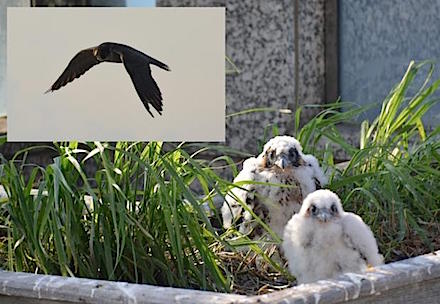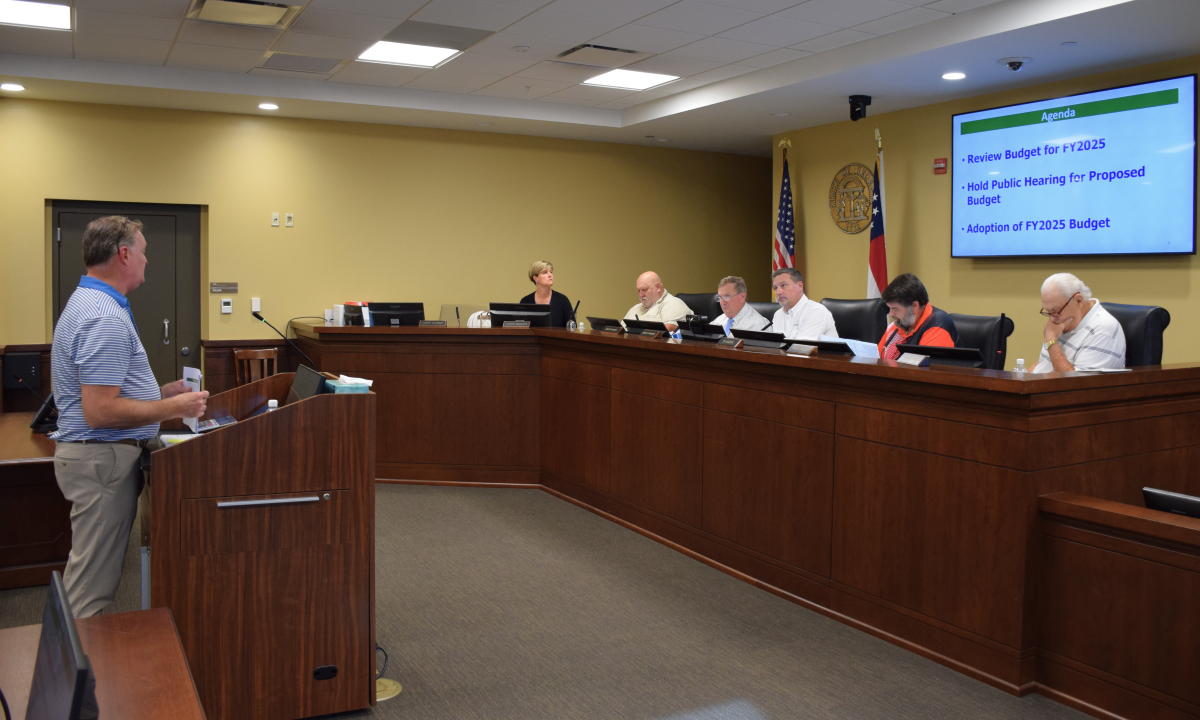
A camera captured this image of peregrine falcons nesting on a SunTrust Plaza Tower balcony more than 50 stories above Atlanta. They have not nested there since 2016. Tallulah Gorge is still the only known wild nesting site in the state. (photo/DNR)
The first extensive search for peregrine falcon nests in Georgia this century has confirmed three key things. The wilds of north Georgia still offer quality habitat for peregrines. Tallulah Gorge still has the state’s only known wild nest site. And metro Atlanta is still Georgia’s favored home for these feathered rockets.
In a helicopter survey, the first for peregrine nests since 1995, Dr. Bob Sargent of the Georgia Department of Natural Resources and other experts flew cliff faces and other sites for falcons and nests in April. Atlanta buildings where the birds are often seen and have nested were checked on foot in May.
Sargent, a program manager with DNR’s Nongame Conservation Section, said the appearance and success of the nesting pair at Tallulah Gorge State Park and reports of falcons at other mountain sites during breeding season made him wonder if there might be nests on other north Georgia cliffs.
“When I checked our records and discovered it had been 23 years since an intensive survey had been conducted, I decided a new survey was overdue.”
World’s fastest birds
These crow-sized falcons are the world’s fastest birds. Peregrines are best known for their 200 mph-plus dives, or stoops, on ducks, pigeons and other prey. Although found on six continents, in the U.S. the species is recovering from a mid-1900s population crash linked to use of the pesticide DDT.
Peregrines were taken off the federal endangered species list in 1999. But they are state-listed as rare in Georgia and rank as a species of significant conservation concern in the State Wildlife Action Plan. This plan is a comprehensive strategy to protect and conserve native wildlife and plants and their habitats.
To help peregrines recover, DNR and partners released nearly 30 young falcons from hacking enclosures in north Georgia from 1988-1994. The region is on the southern edge of the species’ breeding range in the eastern U.S.
The survey Sargent led this year visited those north Georgia sites, and 14 cliff faces in all, from Cloudland Canyon State Park near Rising Fawn to Yonah Mountain in White County.
No eyries, or nests, were found and no falcons were spotted on the cliffs. But at least five areas, particularly Cloudland Canyon, looked suitable for nesting, according to Sargent. Each featured wide and tall cliff faces that were isolated, mostly free of plants and pocked with shelves, overhangs and crevices.
Nesting at inaccessible sites helps protect the eggs and young from predators and human disturbance.
Peregrines have nested on the cliffs at Tallulah Gorge State Park since 2015, Georgia’s first nest in a natural site in nearly 75 years. Although the nest failed this year, the falcons have fledged from six to seven young at the park.
Sargent said a peregrine was seen at a communications tower in DeKalb County during the April flight and from the ground in May. Birders also have reported falcons in and near a drum-like structure on the tower. Despite speculation about a nest in the drum, there has been no definitive evidence of one.
DNR’s previous aerial surveys, in 1995, 1987 and 1992, did not document any nests.
Atlanta falcons
Befitting its NFL team, Atlanta has been the state’s nesting hotspot for peregrines since 1996. As in some other eastern U.S. cities, the falcons have taken advantage of ample nest sites on high-rises, hunting hours extended by bright lights and plentiful prey, from pigeons and doves to starlings and migrating yellow-billed cuckoos.
Although a nest has not been documented in Atlanta since peregrines stopped nesting on SunTrust Plaza Tower balconies in 2015, juveniles have been seen regularly. Observations from sites “between midtown Atlanta and Sandy Springs suggest there might be as many as four (nest) territories,” Sargent said.
While surveying in the metro area last month, he was encouraged by people’s fascination with peregrines. One businessman invited him to scan from his high-rise office. He had seen a peregrine on a nearby ledge in March and been interested in them since.
Sargent hopes this network of watchers, from building owners to maintenance workers, leads to the discovery of other eyries and “a greater understanding of peregrine ecology and management needs in urban environments.”
Please report peregrine nests or nesting behavior to Sargent at (478) 994-1438 or [email protected].
DNR works with landowners to help protect peregrine falcon nests on private property. The Nongame Conservation Section’s mission is to conserve Georgia wildlife not legally fished for or hunted, as well as rare plants and natural habitats. The agency depends primarily on fundraisers, grants and contributions to the Georgia Nongame Wildlife Conservation Fund. That makes public support critical.
Georgians can help by buying or renewing a DNR eagle or hummingbird license plate. Most of the fees are dedicated to wildlife (www.georgiawildlife.com/licenseplates). Upgrade to a wild tag for only $25!
Supporters can also donate at www.gooutdoorsgeorgia.com. Click “Licenses and Permits” and log in to give. (New customers can create an account.) Learn more at www.georgiawildlife.com/donations.
Visit www.georgiawildlife.com/conservation/annualreport to see how this support helps wildlife.
Survey Snapshot
- First aerial survey for peregrine falcon eyries (nests) in north Georgia since 1995. Prior surveys, including in 1987 and 1992, did not document a nest.
- Surveyed 14 north Georgia cliff faces and a communication tower in DeKalb County April 19. Sites included those used for hacking falcons from 1988–1994 (Yonah Mountain, Bell Mountain and Cloudland Canyon), and others were falcons had been reported or were potentially suitable.
- No eyries found; one possible falcon seen, at the communications tower. At least five cliff faces appeared suitable for eyries, particularly Cloudland Canyon, site of a “wild” nest in 1942.
- Follow-up search by ground in Atlanta May 11 included two sightings—a bird at Four Seasons hotel and in the “drum” at the DeKalb tower. No definitive evidence that either was nesting.
- Report sightings and nests to Dr. Bob Sargent, (478) 994-1438), [email protected].
- Peregrine falcons are state-listed as rare in Georgia and a high-priority species in the State Wildlife Action Plan, www.georgiawildlife.com/wildlifeactionplan.
- The word “peregrine” means “pilgrim,” but has evolved in use to include “wanderer.”







